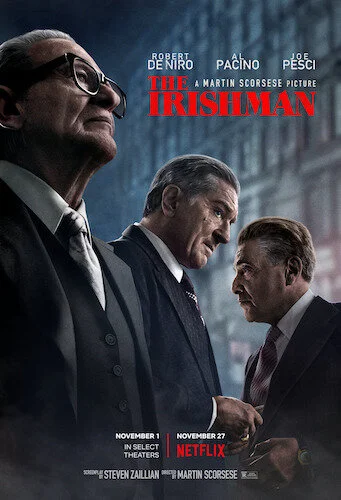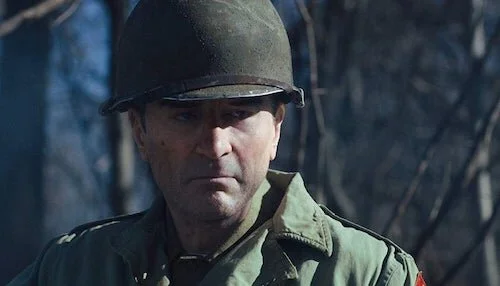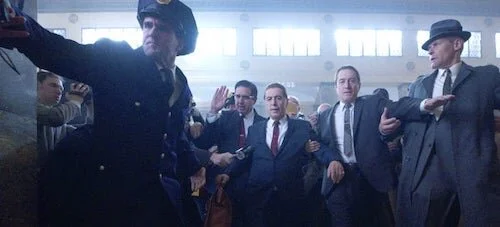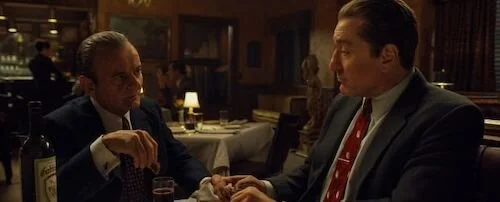The Irishman
Take a good look at the poster for Martin Scorsese’s final gangster film The Irishman. Notice anything about the main character Frank Sheeran? He’s wedged in between mob boss Russell Bufalino and union leader Jimmy Hoffa. The Irishman could have been called The Middleman, and it would have made just as much sense. However, the film is titled the more subtle approach to describing Sheeran’s character. All of The Irishman confirms that Sheeran was doomed to be the middleman for everything. He was the driver between destinations, the mediator in arguments, and the go-to guy to get things done (but never really lead). Even when he gets his power, The Irishman barely shows it. It isn’t important to this story.
Don’t forget that this is a near four hour affair, too. Knowing that the film is very selective in what it shows is important. Technically, Thelma Schoonmaker could have tossed in more establishing moments, but it wouldn’t do the flick any good. As weird as it may be to hear, every single second in this epic counts for something. Its quick pacing makes the film feel maybe two and a half hours at most. The entire production is textbook Scorsese. Considering the scope, the cast, and the subject matter, it gives me great joy to admit that The Irishman is that 2010’s definitive Scorsese film we were all waiting for. Each decade has had one so far: Taxi Driver, Raging Bull, Goodfellas, The Departed, and now The Irishman. This doesn’t mean I think Scorsese only does crime films well: it’s just a major coincidence between most of these gems.
The much-discussed de-aging effects in the film really aren’t that distracting when the story picks up steam.
So, let’s quickly discuss the de-aging effects, since they’re likely on your mind. The Irishman utilizes a specific age range that the cast and crew can get away with; rarely will you see Bobby DeNiro be younger than 40 something. There are also illusions created by lighting and the space between a subject and the camera. In still images, the effect feels a bit wonkier. Luckily, the film is in constant motion, so the deadness of CGI eyes doesn’t distract you for too long. There are one or two very brief disruptions of the digital trickery, but nothing majorly upsetting; an example being Sheeran going about his work (in a non-spoiler way), and you can tell it’s a seventy six year old man in a much younger body. Otherwise, I’m sure you will barely notice the digital effects (especially since the older years are done with physical makeup, so you won’t have to worry about those).
Speaking of de-aging, it has been a very long time since I have seen these fine actors in roles this fantastic. For hours on end, you will forget that Dirty Grandpa, Jack and Jill, Rocky & Bullwinkle, and the countless other garbage films that DeNiro and Al Pacino took part in ever existed. Without question, these are the strongest performances that either legend has given in an exceptionally long time. Joe Pesci doesn’t seem like he retired at all, as he is back to his old ways as well. Toss in some solid supporting roles by Ray Romano, Harvey Keitel, Stephen Graham, and many more, and you have gold. One slight gripe is how little we get to hear from some of the women in the film, especially Anna Paquin’s daughter character (Peggy). I understand that this is a resemblance of the alienation Sheeran caused his family, but her brief screen time and limitation of lines does cause me to beg for more.
Frank Sheeran alongside Jimmy Hoffa.
On that note, family plays an important part in understanding Sheeran’s motives. He submits himself to being the errand boy for higher figures in the criminal underworld, because he wants to protect and provide for his loved ones; he brings up the amount of children that he has making finances more difficult. You never get the feeling that Sheeran is rolling around in his money like a greedy slob. You understand that he means to be a strong husband and father. That’s interesting, because he is arguably bad at both, for many ways. He is blinded by the empty promises of higher powers using him for their own motives.
The only slight deviation was Jimmy Hoffa, who seemed to be a genuine connection with Sheeran and his family (especially his daughter Peggy). Hoffa promises positions of actual worth to Sheeran, rather than treating him like a patsy his entire life. Compare how Hoffa trusts Sheeran so deeply, and yet Bufalino gets Sheeran to drive him to his own gig that he doesn’t want to do (after decades worth of work). Sneer at the film’s duration all you want, but you feel like you are growing up with these figures; all of their connections only become stronger as a result.
Russell Bufalino and Frank Sheeran enjoying a dinner together.
By Sheeran’s isolated end, you’ll know that Scorsese is revisiting themes that are commonly found in his best works. We arrive and leave alone. Your actions determine if you are truly alone at the end of your life. You may purchase your ticket to see how Scorsese deals with the sudden disappearance of Jimmy Hoffa, but you will leave having experienced a definitive gangster film that shows that evil deeds will never lead to a good life. Bad just leads to more bad. You cannot sustain a healthy and safe life by finding solace in sin. Watching all of Sheeran’s kids being baptized, with sinners around them is fitting enough. Seeing these same children divert away from their father is even more telling. The Irishman is richly detailed, and sure enough of its own contents to let you wrap your head around the narrative in any way that you want. It’s classic Scorsese, and it’s happening in 2019.
Andreas Babiolakis has a Masters degree in Film and Photography Preservation and Collections management from Ryerson University, as well as a Bachelors degree in Cinema Studies from York University. His favourite times of year are the Criterion Collection flash sales and the annual Toronto International Film Festival.








